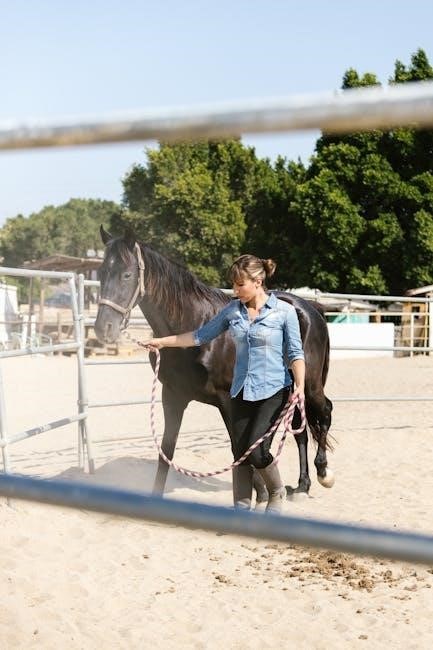
dare to lead pdf
Dare to Lead: Core Concepts
Dare to Lead, by Brené Brown, redefines leadership, emphasizing vulnerability, empathy, and courage. It challenges traditional views, asserting leadership transcends titles, focusing on potential recognition. Courageous leadership begins with vulnerability, not avoiding difficult conversations, but leaning into them.
Vulnerability as a Strength
Brené Brown challenges the conventional perception of vulnerability as a weakness. Instead, she positions it as a cornerstone of courageous leadership. Embracing vulnerability allows leaders to connect authentically with their teams. It fosters a culture of trust and openness. Leaders who dare to be vulnerable create environments where team members feel safe to express ideas, take risks, and learn from failures. This approach inspires loyalty, enhances collaboration, and drives innovation. By modeling vulnerability, leaders empower others to embrace their imperfections and lead with their whole hearts. This ultimately leads to more effective and impactful leadership.
Courage and Leadership
In “Dare to Lead,” Brené Brown challenges the misconception that courage equates to an absence of fear. True courage, she argues, involves confronting fear and uncertainty head-on. Courageous leaders don’t pretend to have all the answers. Instead, they stay curious, ask the right questions, and embrace vulnerability. They recognize the potential in individuals and ideas, fostering a culture of trust and belonging. This environment encourages healthy striving, empathy, and self-compassion. By daring to lead, these leaders inspire their teams to take risks, innovate, and achieve their fullest potential, even in the face of adversity.
Empathy and Connection
Empathy and connection are central to Brené Brown’s “Dare to Lead” philosophy, fostering environments where individuals feel seen, heard, and valued. Leaders who prioritize empathy create a culture of trust and belonging, encouraging open communication and vulnerability among team members. By understanding and sharing the feelings of others, leaders can build stronger relationships, resolve conflicts effectively, and inspire collaboration. Connection emerges from this shared understanding, allowing teams to work together cohesively towards common goals. Ultimately, empathy and connection cultivate a supportive atmosphere where everyone feels empowered to contribute their best work.

The Four Pillars of Daring Leadership
Brené Brown’s “Dare to Lead” introduces four courage-building skill sets vital for daring leadership. These pillars nurture brave leaders and courageous cultures, emphasizing vulnerability, values, trust, and resilience. Mastering these skills empowers individuals and organizations to thrive.
Rumbling with Vulnerability
“Rumbling with Vulnerability” in Brené Brown’s “Dare to Lead” signifies embracing discomfort and uncertainty. It challenges the myth that vulnerability is a weakness, positioning it as a cornerstone of courage. This involves engaging in tough conversations and facing challenging situations head-on, rather than avoiding them. Leaders who rumble with vulnerability foster trust and create environments where team members feel safe to express themselves and take risks. It’s about being honest, authentic, and willing to show up even when there are no guarantees, which ultimately inspires connection and drives innovation within the organization.
Living into Our Values
Living into our values, as Brené Brown outlines in “Dare to Lead”, involves identifying and consciously aligning our actions with our core principles. This necessitates clarity about what we hold most dear, guiding our choices and behaviors. It requires courage to prioritize these values even when facing pressure or discomfort. By acting congruently with our values, we build trust and authenticity, fostering a culture of integrity. This also means being accountable when we fall short, using these moments as opportunities for growth and reinforcing the importance of consistency.
Braving Trust
“Braving Trust,” a core concept from Brené Brown’s “Dare to Lead,” emphasizes the importance of trust-building through specific behaviors. BRAVING stands for Boundaries, Reliability, Accountability, Vault, Integrity, Non-judgment, and Generosity. These elements create a framework for understanding and cultivating trust in relationships. It involves setting clear boundaries, being reliable in commitments, holding ourselves and others accountable, and maintaining confidentiality. It also requires acting with integrity, approaching situations without judgment, and extending generosity. By consistently practicing these behaviors, leaders can foster a culture of trust, essential for courageous leadership.
Learning to Rise
“Learning to Rise” from Brené Brown’s “Dare to Lead,” focuses on resilience after setbacks. It involves recognizing our emotions, getting curious about our feelings, and rewriting our stories. It requires acknowledging when we’re struggling, rather than avoiding difficult emotions. Understanding our triggers and vulnerabilities allows us to reframe our narratives. This process involves owning our stories and challenging the narratives that hold us back. It also requires practicing self-compassion and empathy. Leaders can model this resilience, creating a culture where vulnerability is accepted, and individuals feel supported in their journeys.

Key Themes and Principles
Brené Brown’s Dare to Lead centers on vulnerability, courage, and empathy. It highlights trust, honest communication, and redefining leadership, emphasizing individuals’ potential. It advocates for creating a culture where everyone feels seen, heard, valued, and courageous.
Redefining Leadership
Dare to Lead challenges traditional notions of leadership, asserting it’s not about titles or authority, but recognizing potential in people and ideas. True leadership, according to Brown, begins with vulnerability, requiring courage to have difficult conversations and leaning into discomfort for growth. Daring leaders don’t pretend to have all the answers; instead, they stay curious, ask the right questions, and foster a culture of trust and belonging. This approach cultivates environments where individuals feel seen, heard, and valued, empowering them to reach their full potential. It’s about leading with authenticity and heart.
Importance of Trust
In Dare to Lead, trust emerges as a cornerstone of courageous leadership, fostering environments where individuals feel safe to be vulnerable and take risks. Building trust requires leaders to cultivate a culture of belonging, where everyone feels seen, heard, and valued. When trust is present, team members are more likely to engage in honest communication, share innovative ideas, and support one another. It’s about creating connections and embracing authenticity. Leaders who prioritize trust inspire loyalty and create environments where people can thrive.
Honest Communication
Dare to Lead underscores the pivotal role of honest communication in fostering courageous leadership and cultivating a culture of trust. Honest communication necessitates vulnerability, requiring leaders to share their perspectives openly and authentically. Active listening and empathy are essential components of honest communication, enabling leaders to understand diverse viewpoints. By prioritizing transparency and candor, leaders create an environment where individuals feel safe to express their ideas, concerns, and feedback. This commitment to honest dialogue strengthens relationships, facilitates problem-solving, and drives collective success.

Practical Applications and Actionable Insights
Dare to Lead offers practical guidance for building courageous cultures through actionable insights. It emphasizes cultivating trust, having tough conversations, and redefining leadership. These applications enable leaders to inspire teams, drive positive change, and achieve collective goals.
Cultivating a Culture of Trust
Cultivating a culture of trust is a cornerstone of daring leadership, fostering environments where individuals feel safe, seen, and valued. It involves building trust through mindful leadership, where everyone feels heard and respected. In this culture, vulnerability is not a weakness but a strength, inspiring loyalty and connection.
Leaders model empathy, healthy striving, and self-compassion, encouraging open communication. This approach requires skill-building around uniquely human traits, allowing teams to thrive in environments defined by uncertainty. Cultivating trust involves building courage, leading with authenticity, and recognizing potential.
Having Tough Conversations
Daring leadership necessitates the ability to have tough conversations with courage and empathy. These conversations are crucial for addressing difficult situations and fostering a culture of accountability. Leaders must approach these discussions with honesty, vulnerability, and a willingness to listen.
Having tough conversations involves leaning into vulnerability, staying curious, and asking the right questions. It means not avoiding difficult situations, but addressing them directly with a commitment to finding solutions. These conversations should create a safe space for open dialogue and mutual understanding, building stronger relationships.
Building Courageous Cultures
Cultivating courageous cultures involves creating environments where individuals feel safe to take risks and be vulnerable. This requires a shift in mindset, promoting trust, empathy, and open communication. Leaders play a critical role in modeling courageous behavior and fostering a culture of psychological safety.
Building courageous cultures means encouraging healthy striving, self-compassion, and empathy. It emphasizes being a learner, using power with others, and creating a sense of belonging. By embracing vulnerability and encouraging honest communication, organizations can foster environments where people feel empowered to lead.

Brené Brown’s Perspective
Brené Brown challenges traditional leadership views through research and personal insights. She redefines leadership by highlighting vulnerability, courage, and empathy. Brown encourages leaders to foster trust, connection, and accountability by embracing vulnerability.
About Brené Brown
Brené Brown, PhD, LMSW, is a research professor at the University of Houston, known for her work on vulnerability, courage, shame, and empathy. Her TED Talk on vulnerability is among the most-watched. Brown’s research explores how these qualities impact leadership, relationships, and personal growth. She challenges traditional leadership notions, advocating for authenticity and connection. In Dare to Lead, Brown shares learnable skills for daring leadership. She emphasizes building courage and fostering cultures of trust. Brown’s work provides actionable advice for leaders seeking to cultivate brave work, tough conversations, and wholeheartedness within their teams. Her insights redefine what it means to be a leader.
Brown’s Research on Vulnerability and Courage
Brené Brown’s research fundamentally links vulnerability and courage, challenging the perception of vulnerability as weakness. She asserts that vulnerability is essential for courageous leadership, fostering trust and connection. Her work explores how embracing vulnerability enables leaders to have tough conversations and create cultures of belonging. Brown’s research shows that daring leadership requires skill-building around uniquely human traits. Leaders must lean into vulnerability when necessary to do good work. She emphasizes that vulnerability inspires loyalty and trust. Brown’s insights offer practical guidance for building courageous cultures. Her work redefines leadership, highlighting authenticity and wholeheartedness as crucial elements for success.